|
|
|
Sort Order |
|
|
|
Items / Page
|
|
|
|
|
|
|
| Srl | Item |
| 1 |
ID:
007149
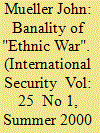

|
|
|
|
|
| Publication |
Summer 2000.
|
| Description |
42-70
|
|
|
|
|
|
|
|
|
|
|
|
|
|
|
|
| 2 |
ID:
101342
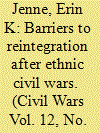

|
|
|
|
|
| Publication |
2010.
|
| Summary/Abstract |
This article evaluates the record of minority return in Croatia, Bosnia and Kosovo to assess the viability of ethnic reintegration in the wake of protracted sectarian violence. Comparative analysis reveals that the logic of post-war ethnic spoils has greatly limited the success of such programmes. What success has been achieved is largely due to third party efforts to disrupt patronage networks and challenge post-war authorities. I conclude that these factors are more significant barriers to reintegration than inexorable ethnic hatreds and fears derived from memories of war. Because such barriers are more readily overcome than entrenched grassroots hostilities, there may be more hope for reintegration than previously thought. However, the systematic failure of the international community to protect and assist prospective minority returnees suggests that continued scepticism of post-war reintegration is in order.
|
|
|
|
|
|
|
|
|
|
|
|
|
|
|
|
| 3 |
ID:
020621
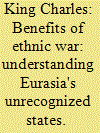

|
|
|
|
|
| Publication |
July 2001.
|
| Description |
524-552
|
|
|
|
|
|
|
|
|
|
|
|
|
|
|
|
| 4 |
ID:
124711


|
|
|
|
|
| Publication |
2013.
|
| Summary/Abstract |
The holy month of Muharram is a dangerous time in Pakistan. It marks the beginning of the Islamic calendar but is also a period of mourning for Shiite Muslims. Each year, in the overflowing metropolis of Karachi, they take to the streets in processions by the thousands to observe Ashura, the anniversary of the martyrdom of Hussein ibn Ali, the Prophet Mohammed's grandson, and one of the holiest days of the year for Shiite Muslims. It is often a bloody affair, and not just because of the ritual self-flagellation in which many of the devout partake. Over the past four years, with astonishing punctuality, Shiite processions and mosques have been brutally attacked by Sunni supremacist militants bent on starting a sectarian war.
|
|
|
|
|
|
|
|
|
|
|
|
|
|
|
|
| 5 |
ID:
066735
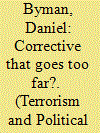

|
|
|
| 6 |
ID:
128874
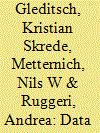

|
|
|
|
|
| Publication |
2014.
|
| Summary/Abstract |
We highlight how efforts to collect systematic data on conflict have helped foster progress in peace and conflict research. The Journal of Peace Research has played a key role in these developments, and has become a leading outlet for the new wave of disaggregated conflict data. We survey progress in the development of conflict data and how this interacts with theory development and progress in research, drawing specifically on examples from the move towards a greater focus on disaggregation and agency in conflict research. We focus on disaggregation in three specific dimensions, namely the resolution of conflict data, agency in conflict data, and the specific strategies used in conflict, and we also discuss new efforts to study conflict processes beyond the use of violence. We look ahead to new challenges in conflict research and how data developments and the emergence of 'big data' push us to think harder about types of conflict, agency, and the 'right' level of aggregation for querying data and evaluating specific theories.
|
|
|
|
|
|
|
|
|
|
|
|
|
|
|
|
| 7 |
ID:
019942
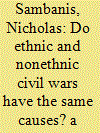

|
|
|
|
|
| Publication |
June 2001.
|
| Description |
259-282
|
|
|
|
|
|
|
|
|
|
|
|
|
|
|
|
| 8 |
ID:
153174
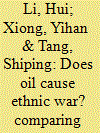

|
|
|
|
|
| Summary/Abstract |
This article contributes both empirically and methodologically. Empirically, we seek to advance our understanding of an important puzzle: does oil cause ethnic war? Methodologically, we seek to identify more precisely the different weaknesses and strengths of the quantitative approach and case studies with process-tracing by explicitly comparing results from these two approaches on the same empirical question. We thus subject the statistical association between the ethnogeographical location of oil and the onset of ethnic war to test with process-tracing. Examining several pathway cases, we find that oil has rarely been a deep cause of ethnic war. Instead, the ethnogeographical location of oil either reignites dormant conflict that has deeper roots in ethnic resentment and hatred or intensifies ongoing conflict, mostly by facilitating the operation of two interconnected mechanisms. Our study echoes the notion that quantitative exercises alone often cannot establish specific causal mechanisms or how contextual factors impact the operation of these mechanisms, and it is precisely on these two key fronts that qualitative exercises possess critical advantages. Hence, quantitative methods and qualitative methods are complementary rather than competitive. Our study also yields important policy implications for preventing and managing ethnic conflict in countries with rich mineral resource.
|
|
|
|
|
|
|
|
|
|
|
|
|
|
|
|
| 9 |
ID:
118708
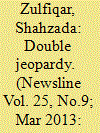

|
|
|
| 10 |
ID:
103866
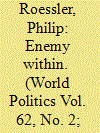

|
|
|
|
|
| Publication |
2011.
|
| Summary/Abstract |
Why do rulers employ ethnic exclusion at the risk of civil war? Focusing on the region of sub-Saharan Africa, the author attributes this costly strategy to the commitment problem that arises in personalist regimes between elites who hold joint control of the state's coercive apparatus. As no faction can be sure that others will not exploit their violent capabilities to usurp power, elites maneuver to protect their privileged position and safeguard against others' first-strike capabilities. Reciprocal maneuvering, however, reinforces suspicion and increases intrigue within the regime, undermining trust and often triggering a security dilemma. In the face of a rising internal threat, rulers move to eliminate their rivals to guarantee their personal and political survival. But the cost of such a strategy, especially when carried out along ethnic lines, is that it increases the risk of a future civil war. To test this argument, the author employs the Ethnic Power Relations data set combined with original data on the ethnicity of conspirators of coups and rebellions in Africa. He finds that in Africa ethnic exclusion substitutes civil war risk for coup risk. And rulers are significantly more likely to exclude their coconspirators-the very friends and allies who helped them come to power-than other included groups, but at the cost of increasing the risk of a future civil war with their former allies. In the first three years after being purged from the central government, coconspirators and their coethnics are sixteen times more likely to rebel than when they were represented at the apex of the regime.
|
|
|
|
|
|
|
|
|
|
|
|
|
|
|
|
| 11 |
ID:
068747
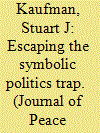

|
|
|
| 12 |
ID:
151240
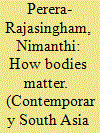

|
|
|
|
|
| Summary/Abstract |
Contemporary working-class women’s theaters from within Export Processing Zones in Sri Lanka are rich sites for documenting the development and nature of working-class, feminist and ethnic consciousness. Through a careful analysis of workers’ ‘development dramas’ – theater that contests dominant forms of development – their performative acts on a factory floor, and visual materials, this paper will explore how bodies are produced and made to matter. I will demonstrate how from their inception in the late 1970s onward, these zones were designed to cater to the needs of neoliberal capital and an increasingly ethnicized state at war with separatist Tamil forces. As such, even as the welfare state has been dismantled by neoliberalism, the military and ethnic powers of the state were expanded through these zones. An analysis of workers’ plays allows us to understand the relationship between ethnic war and neoliberalism as they intersect with gender. These plays allow us to explore the conditions of possibility for a working-class feminist consciousness and its limits. To conclude, this paper will consider how these zones have changed after 2009, in the post-war context, with the inclusion of Tamil women workers within.
|
|
|
|
|
|
|
|
|
|
|
|
|
|
|
|
| 13 |
ID:
056702
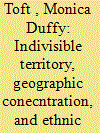

|
|
|
| 14 |
ID:
100285
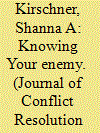

|
|
|
|
|
| Publication |
2010.
|
| Summary/Abstract |
When do civil wars last especially long? Commitment problems can stymie conflict resolution but they are not homogeneous across all civil wars. Indeed, combatants' perceptions of their adversaries significantly affect the severity of commitment problems. Intergroup interactions provide combatants with one crucial type of information about their adversaries and about the risks associated with signing a peace settlement, shaping strategic decisions. The argument is tested against a new data set of all ethnic civil wars between 1945 and 2004. The results demonstrate that intergroup interactions prolong wars when they indicate that a peace deal will be especially fragile or that the costs of it breaking down will be especially high. This is true, regardless of the combatants' goals or their capabilities. In sum, information shapes perceptions and the severity of commitment problems, in turn affecting the duration of civil wars.
|
|
|
|
|
|
|
|
|
|
|
|
|
|
|
|
| 15 |
ID:
093587
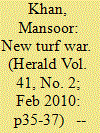

|
|
|
| 16 |
ID:
046210


|
|
|
|
|
| Publication |
Sweden, Uppasala University, 2002.
|
| Description |
246p.
|
| Standard Number |
915061651X
|
|
|
|
|
|
|
|
|
|
|
|
Copies: C:1/I:0,R:0,Q:0
Circulation
| Accession# | Call# | Current Location | Status | Policy | Location |
| 046175 | 305.8/OBE 046175 | Main | On Shelf | General | |
|
|
|
|
| 17 |
ID:
007071
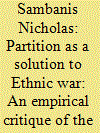

|
|
|
|
|
| Publication |
July 2000.
|
| Description |
437-483
|
|
|
|
|
|
|
|
|
|
|
|
|
|
|
|
| 18 |
ID:
109575
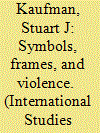

|
|
|
|
|
| Publication |
2011.
|
| Summary/Abstract |
This article examines the utility of opportunity theory, framing analysis, and symbolic politics theory in explaining the causes of ethnic war, focusing on the 1970s Mindanao case. Opportunity variables are present as expected, but process-tracing shows they do not operate according to the hypothesized mechanisms. The framing approach identifies several important dynamics. The resonance of frames was influenced by the salience of the issue highlighted, the narrative fidelity of the frame to preexisting cultural beliefs, the credibility of leaders proposing them, and processes of frame bridging. Symbolic politics theory offers the most complete explanation, embracing most of the alternative explanations' insights while filling in their logical gaps. The symbolist analysis begins with group myths justifying hostility on both sides, the result of past Christian-Muslim warfare. Combined with fears of group extinction, opportunity factors, and hostile popular attitudes, these myths enabled group elites to manipulate emotive symbols to justify mobilization against the other group, creating a security dilemma spiral that resulted in the outbreak of war.
|
|
|
|
|
|
|
|
|
|
|
|
|
|
|
|
|
|
|
|
|